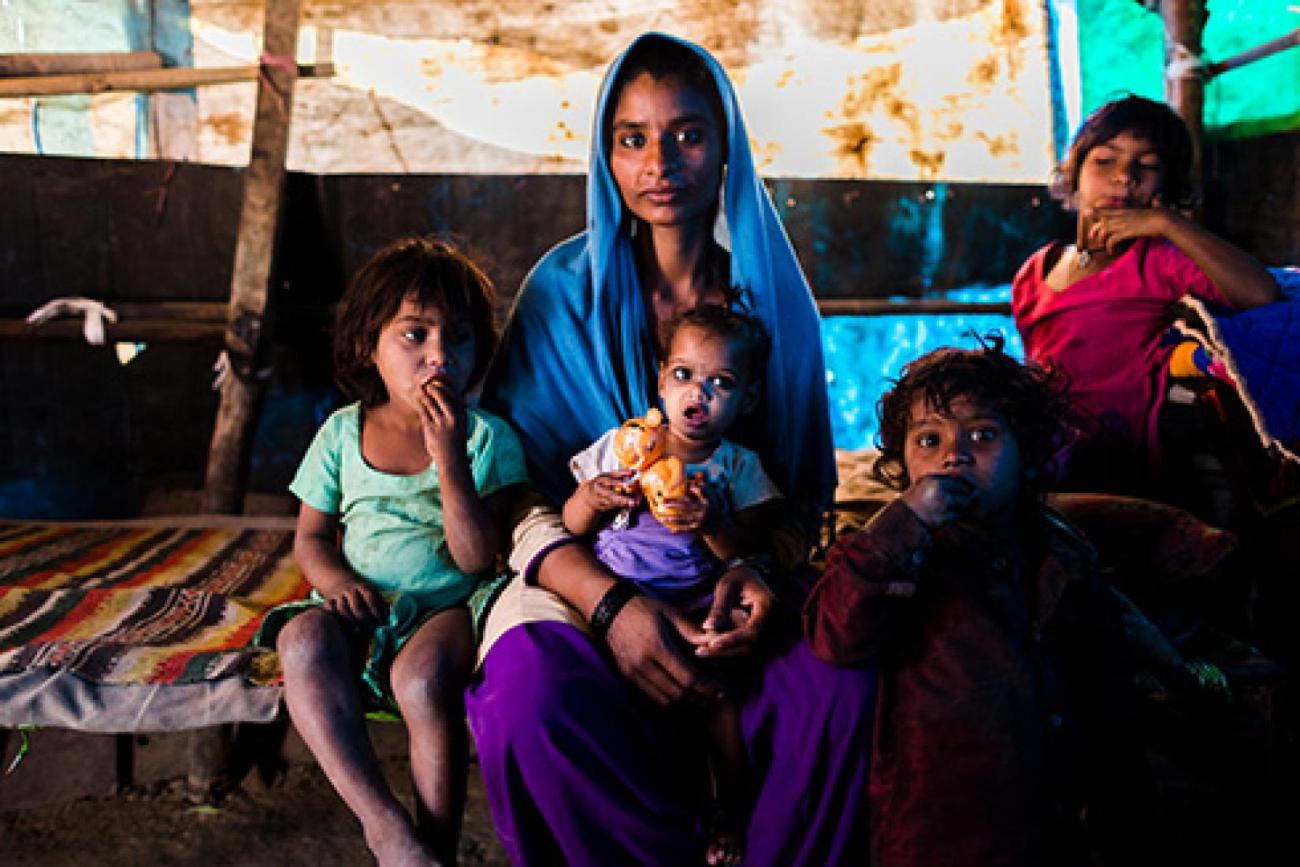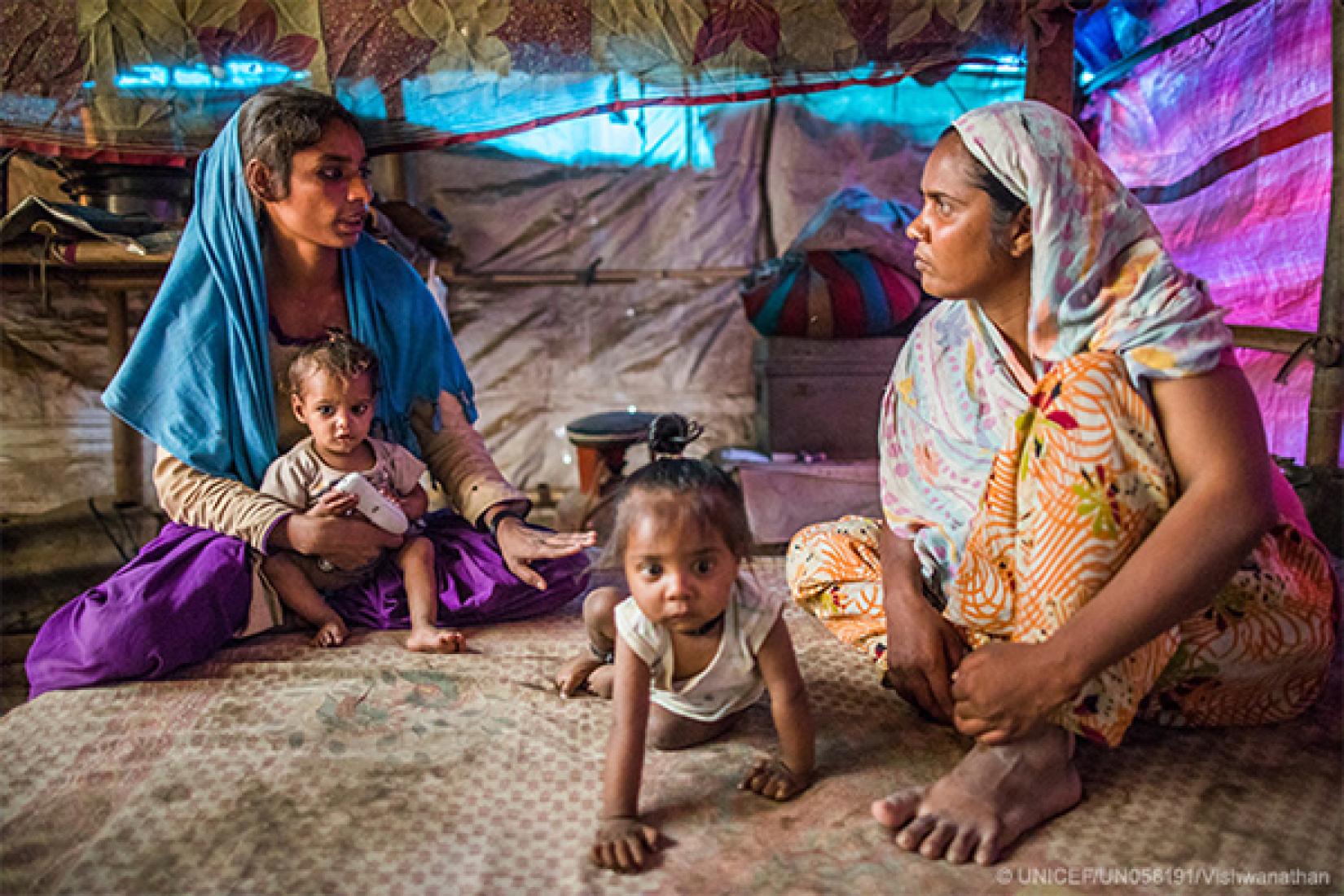World Immunisation Week: An advocate for vaccines

During World Immunisation Week 2017, read Nazaama's incredible story.
It is pitch dark as 27-year-old Nazaama quietly pats her one-year-old daughter back to sleep, pushing back the torn plastic sheet that serves as a door to her little hut.
Today, like every other day for Nazaama starts at 4 a.m. She walks empty alleys, rummaging through the trash bins before the garbage trucks make their morning rounds. Using a stick to dig deep into the mounds of mixed household rubbish, she picks out discarded plastic bottles, collecting them in the large sling bag across her shoulders. After five hours, she hurries back home, happy with her cache that she sells for less than US$3 to the informal shops that recycle the plastic. Today her children will have a full meal. This is Chandmari – an urban settlement of 417 rag picker families in Ghaziabad, Uttar Pradesh, just 20 miles from India’s national capital New Delhi.
Living in tattered huts made of plastic sheets and bamboo sticks with electric wires drawn illegally from the municipal supply, Chandmari is a settlement that the world has forgotten. “Kismet. This is fate. Life has to be lived somehow,” says Nazaama sitting on her cot made of rope. She seems tired, but her face, framed by a blue shawl, has a certain strength as her soft voice fills the hut. Hers was a love marriage – the first in the close-knit community of rag pickers. Married at 18 to Abrar, who earns a living from performing stunts and magic tricks on the streets, she has four children. Unlike many of the parents in Chandmari, Nazaama has made sure all of her children are fully vaccinated.

A vaccine advocate In Uttar Pradesh, India’s most populous state, only 50 per cent of children are fully immunised. District Ghaziabad where Chandmari is located has over 12,000 families working and living at 365 brick kilns, 118 construction sites, 42 nomadic settlements and 131 slums. Out of 656 sites with high-risk groups, almost 6,000 children under 5 years of age should be fully vaccinated. Fewer than 1,000 are. Dropout rates are high. Myriad reasons are given. The child was sick. Last time there was a fever. We were visiting. I am a daily labourer and if I don’t earn, then what will my family eat? Or simply not knowing. Parents are not educated about the number of vaccines needed, the diseases that they prevent, and the timing of the shots. In a community where most mothers do not understand the long-term health benefits of immunisation, Nazaama is a rare advocate for vaccines.
She understood the benefits of immunisation early. When her oldest child, Aafiya, was born eight years ago, Saarika Khanna, a community mobilizer from UNICEF’s social mobilisation network, counselled Nazaama about the importance of protecting the child against polio and other vaccine-preventable diseases like measles and pneumonia.
Ms Khanna was the one who advised Nazaama to fully immunise her child. “I was scared of the needle when I got my TT [tetanus toxoid] shots,” Nazaama says. “When I could not bear the pain of the injection, how could I subject my little girl to it?” But still, she took Aaliyah in for her first shots on Ms Khanna’s insistence. “Jab itne dukh sahe, to yeh bhi dukh seh lenge, when life has given me so many sorrows, let me bear one more,” she remembers. To her surprise, the experience was good. Her baby was soon her smiling self again. The community mobilizers now had a staunch supporter in Nazaama. The evening before the monthly immunisation sessions, Ms Khanna would inform Nazaama about the list of families whose children were due for immunisation. The next morning, a determined Nazaama would cajole, counsel and persuade them to take the children to the nearby Anganwadi (community centre) where the nurse midwife would be waiting with the vaccines. One of her toughest challenges was in convincing her own sister-in-law Churchuri about immunising her five-month-old daughter. “I have myself taken children for immunisation if the mother was not willing to take the trouble of going to the site. I did this for Churchuri too,” says Nazaama. “These are also my children, aren’t they?
For more on World Immunisation Week 2017 Click here for facts and information. Learn more about UNICEF India's work on Immunisation here. Visit UNICEF India's website here.
This story was originally published on www.unicef.org. For more, click here.

















